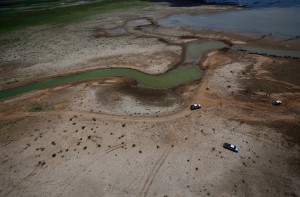
Thailand hopes to help its drought-affected farmers by “using” water from the Mekong, but those downstream may be adversely affected
Thailand has begun pumping water from the Mekong River into drought-affected areas in the northeast of the country in a move that could have severe impacts for countries downstream.
|
At present, three pumps, each of them capable of pumping 12,000 litres per second from the river, are in operation. Thailand is experiencing its worst dry spell in ten years, and provinces in the north and northeast have been hit hard. Production of rice and rubber – both key export crops – has plummeted, adding to the country’s existing economic woes. “To pump water from the Mekong seems rational not only in terms of real need, but for political reasons,” said Pavin Chachavalpongpun, associate professor at Kyoto University’s Centre of Southeast Asian Studies. |
|
The current military-led government has been criticised for being unable to solve many issues, and the latest is the drought, Chachavalpongpun said. “The junta doesn’t work well with Thai farmers, so to prevent further anger from them, the junta may find extracting water from the Mekong is a politically useful solution,” he added.
Pumping water from the Mekong into Thailand’s drought-affected areas is nothing new, explained Philip Hirsch, professor of human geography at the University of Sydney. “Every time there is a drought in Thailand this issue comes up,” he said. “It has taken various forms over the years – Green Isan in the 1980s, the Khong Chi Mun project in the 1990s, Water Grid in the 2000s.”
These projects were based on the idea of diverting water from the Mekong into the upper Chi and Mun river system, but Hirsch said the current scheme is based more on retaining water in large basins in provinces adjoining the Mekong. This would be supplemented by water pumped under the Mekong from the Nam Ngum tributary in Laos.
“This [is], in part, a move to make it a bilateral issue between Thailand and Laos rather than a multilateral issue involving all four members of the Mekong River Commission,” he said, “but the effect on downstream countries would be the same.”
If large-scale pumping from the Mekong continues, said Hirsch, it would be a dangerous threat to the dry-season water security of Cambodia and Vietnam, since the scheme is primarily geared toward dry-season extraction. “Agriculture and other water users in the Mekong Delta depend on dry-season flows both for their own water availability and to keep saline intrusion at bay,” he continued. “So any reduction in flows resulting from upstream extraction would create big problems for downstream users.”
The Bangkok Post noted that the Royal Irrigation Department said it was “using” water from the Mekong as opposed to “diverting” it. Any diversion of water from the river would have required prior consultation with the Mekong River Commission (MRC), the international body that works with Thailand, Laos, Cambodia and Vietnam on the Mekong’s management.
“Whatever the term they use, it’s a bad project and it will affect millions of people living along the Mekong,” said Senglong Youk, programme manager for the Fisheries Action Coalition Team, a Cambodian NGO. “The river is the common property of all the Mekong’s people, not just Thais or Laotians. There has to be a wider public consultation among Mekong country members.”
“The Thai government has to listen to the public,” said Youk. “Even Thai people do not support the project. I also don’t believe in the MRC mechanism, as there have been a lot of failures in good governance of water management made by MRC. Public consultation and comprehensive studies, for example environmental impact assessments, are vital.”
Thailand’s move comes as Laos continues construction of the controversial Don Sahong Dam on the Mekong, situated downstream from the Thai pumping activity. The dam project has been widely criticised, with NGO International Rivers considering it a “disaster” for fish stocks in Vietnam and Cambodia.
This article was updated on January 27, 2016
Source: http://sea-globe.com/thais-turn-on-mekong-river-pumps-without-consulting-regional-partners/
















Leave a Reply